名词性从句&定语从句
名词性从句讲解(最全版)
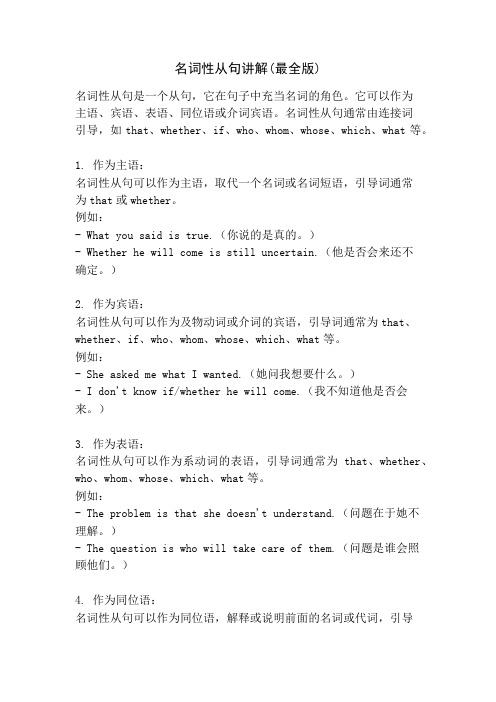
名词性从句讲解(最全版)名词性从句是一个从句,它在句子中充当名词的角色。
它可以作为主语、宾语、表语、同位语或介词宾语。
名词性从句通常由连接词引导,如that、whether、if、who、whom、whose、which、what等。
1. 作为主语:名词性从句可以作为主语,取代一个名词或名词短语,引导词通常为that或whether。
例如:- What you said is true.(你说的是真的。
)- Whether he will come is still uncertain.(他是否会来还不确定。
)2. 作为宾语:名词性从句可以作为及物动词或介词的宾语,引导词通常为that、whether、if、who、whom、whose、which、what等。
例如:- She asked me what I wanted.(她问我想要什么。
)- I don't know if/whether he will come.(我不知道他是否会来。
)3. 作为表语:名词性从句可以作为系动词的表语,引导词通常为that、whether、who、whom、whose、which、what等。
例如:- The problem is that she doesn't understand.(问题在于她不理解。
)- The question is who will take care of them.(问题是谁会照顾他们。
)4. 作为同位语:名词性从句可以作为同位语,解释或说明前面的名词或代词,引导词通常为that、whether、who、whom、whose、which、what等。
例如:- The fact that he lied surprised me.(他撒谎的事实让我感到惊讶。
)- His belief that she will succeed is unwavering.(他坚信她会成功。
名词性从句
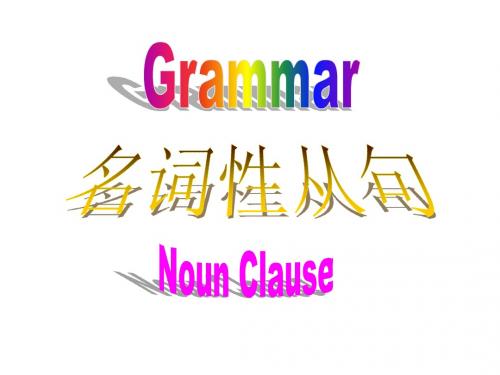
出品
三、宾语从句
在句中充当及物动词或介词宾语的句子叫做 宾语从句。 我不知道你会来这里。 I don’t know (that) you will come here.
三、宾语从句
1、用作及物动词的宾语 (1) They pretended that they were reading in the room. (2) I didn’t know what they were talking about.
以it作形式主语,把主语从句后置的常 用句型有:
1. It+be+形容词+that从句
It is/was certain that – clause
clear
important necessary probable possible
出品
(1)It is certain that she will do
出品
一、主语从句
在句中充当主语的从句叫做主语从句。 他星期三来这里是肯定的。
That he will come here on Wednesday is certain.
注意:从句作主语时,就算是句子意思完整,都 要加上从属连词that, 而且that不能省略,不充当 成分仅起连接作用。 他星期三是否来这里还不肯定。 Whether he will come here on Wednesday is not certain. 注意:主语从句表示“是否” 只用 “whether” 而不用“if”
well in her exam.
(2) It is probable that he told her everything.
www.010englBiblioteka 出品
名词性从句

语序:陈述语序
在句中充当主语的从句称为主语 从句。英语中主语从句的句型可分 为两大类: 直接将主语从句放在主语位置上; 用it作形式主语,将真正的主语从 句后移,放在其他成分后。
让我们先说说第一类吧!
一、连接词(只起连接作用,在从句中不充当句子成分)
that:无词义。 e.g.: 他赢得比赛一事在我国引起巨大轰动。 That he won the game made a tremendous stir in our country. whether:“是否”。可单独使用,也可与or或or not连用。 e.g.: 我们明天是否能去春游取决于天气。 Whether we can go for a spring outing depends on the weather. 他们是否会来还未告诉我们。 Whether they will come has not been told to us.
四、主语从句与主谓一致
一个从句作主语时,谓语动词通常用单数形式, 特别是用it作形式主语的句型。 e.g.: Whether this kind of chemicals is better has not been tried.
当what引导主从,应遵循意义一致原则,谓语动 词选用相应形式。表语是复数时,谓语动词用复数 形式。 e.g.: What we do willingly is easy. What they were searching for were the missing gems.
Introduction
名词性从句:包括四种:主语从句、表语从句、宾语从
句、同位语从句。
连词:引导名词性从句的连词有以下三类
连接词:只起连接作用,在从句中不充当句子成分; 连接代词:连接主从句,并在从句中作主语/宾语/表 语/定语; 连接副词:连接主从句,并在从句中作时状/地状/原 因状/方式状。
名词性从句完整版

注意事项:that在从句中不可省略的情况有:宾语从句中引导词that省略;主语从句中引导词that不可省略;表语从句中引导词that不可省略。
例子:I think (that) you are right. 宾语从句中引导词that省略。
虚拟语气的时态:与现在事实相反,从句和主句的时态均为一般过去时
虚拟语气的使用场合:在某些从句中,如条件状语从句、让步状语从句等
与过去事实相反的情况
虚拟语气的形式:与过去事实相反,从句使用“had+过去分词”,主句使用“would+have+过去分词”
虚拟语气的使用:表示与过去事实相反的假设情况,常用于表达遗憾、后悔等情感
例子:When he comes, we will have a party. (时间状语从句)
宾语从句
添加标题
添加标题
添加标题
添加标题
特点:在句子中句叫做宾语从句。
种类:陈述句、一般疑问句、特殊疑问句和祈使句。
连接词:that、if、whether等。
汇报人:XX
感谢观看
虚拟语气的例子:If I had known the answer, I would have told you.(如果我早知道答案,我早就告诉你了。)
与真实情况的比较:与真实情况相比较,虚拟语气表达的是与过去事实相反的情况,而不是真实发生的情况
与将来事实相反的情况
虚拟语气的形式:与将来事实相反,从句使用“if+主语+were/did+动词原形”,主句使用“would+动词原形”
05
名词性从句的特殊用法
从句中的省略现象
名词性从句
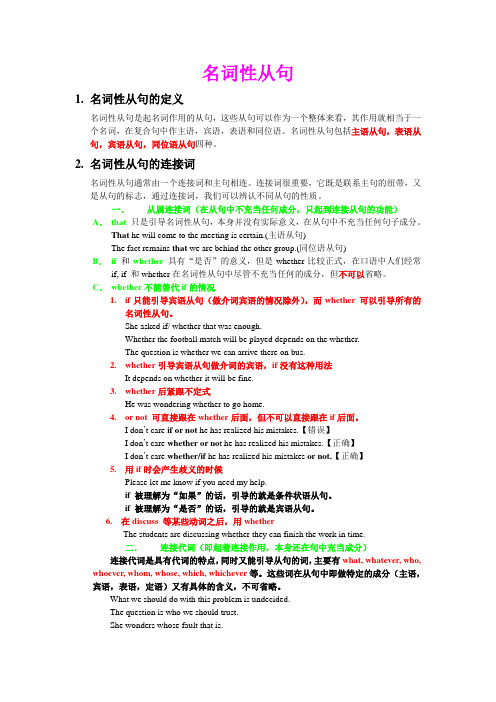
名词性从句1.名词性从句的定义名词性从句是起名词作用的从句,这些从句可以作为一个整体来看,其作用就相当于一个名词,在复合句中作主语,宾语,表语和同位语。
名词性从句包括主语从句,表语从句,宾语从句,同位语从句四种。
2.名词性从句的连接词名词性从句通常由一个连接词和主句相连。
连接词很重要,它既是联系主句的纽带,又是从句的标志,通过连接词,我们可以辨认不同从句的性质。
一.从属连接词(在从句中不充当任何成分,只起到连接从句的功能)A.that 只是引导名词性从句,本身并没有实际意义,在从句中不充当任何句子成分。
That he will come to the meeting is certain.(主语从句)The fact remains that we are behind the other group.(同位语从句)B.if和whether具有“是否”的意义,但是whether比较正式,在口语中人们经常if, if 和whether在名词性从句中尽管不充当任何的成分,但不可以省略。
C.whether不能替代if的情况1.if只能引导宾语从句(做介词宾语的情况除外),而whether 可以引导所有的名词性从句。
She asked if/ whether that was enough.Whether the football match will be played depends on the whether.The question is whether we can arrive there on bus.2.whether引导宾语从句做介词的宾语,if没有这种用法It depends on whether it will be fine.3.whether后紧跟不定式He was wondering whether to go home.4.or not 可直接跟在whether后面,但不可以直接跟在if后面。
名词性从句

表语从句( the Predicative Clause ) The question is who can do the experiment. The reason for his lateness was that he got up late. China is no longer what she used to be.
连接词 ( Conjunctions )
that, whether/if(只用于宾语从句), as if (只用于表语从句) 连接代词( Conjunctive pronouns )
who, which, what, whose(宾语从句)
连接副词( Conjunctive adverbs )
when, where, how, why
B (4) These photographs will show you ______. A. what does our village look like B. what our village looks like C. how does our village look like D. how our village looks like A (5) _____ he said at the meeting astonished everybody present. A. What B. That C. The fact D. The matter D for the violin. (6) He asked _____ A. did I pay how much B. I paid how much C. how much did I pay D. how much I paid
பைடு நூலகம்
主语从句( the Subject Clause ) Whether we will visit the Great Wall tomorrow has not been decided. That he will come is certain. It is certain that he will come. How this happened is still a question. What he said at the meeting is important.
名词性从句的三种类型及例句解析
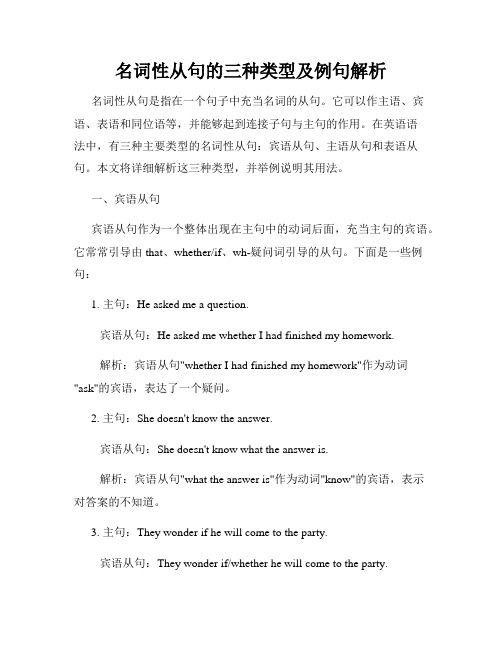
名词性从句的三种类型及例句解析名词性从句是指在一个句子中充当名词的从句。
它可以作主语、宾语、表语和同位语等,并能够起到连接子句与主句的作用。
在英语语法中,有三种主要类型的名词性从句:宾语从句、主语从句和表语从句。
本文将详细解析这三种类型,并举例说明其用法。
一、宾语从句宾语从句作为一个整体出现在主句中的动词后面,充当主句的宾语。
它常常引导由that、whether/if、wh-疑问词引导的从句。
下面是一些例句:1. 主句:He asked me a question.宾语从句:He asked me whether I had finished my homework.解析:宾语从句"whether I had finished my homework"作为动词"ask"的宾语,表达了一个疑问。
2. 主句:She doesn't know the answer.宾语从句:She doesn't know what the answer is.解析:宾语从句"what the answer is"作为动词"know"的宾语,表示对答案的不知道。
3. 主句:They wonder if he will come to the party.宾语从句:They wonder if/whether he will come to the party.解析:宾语从句"if/whether he will come to the party"作为动词"wonder"的宾语,表达了对他是否会来参加派对的疑问。
二、主语从句主语从句作为一个整体出现在句子的最前面,充当主句的主语。
它通常由that引导,也可以由wh-疑问词引导。
以下是一些例句:1. 主句:It is important to learn a foreign language.主语从句:That she is a hardworking student is important.解析:主语从句"That she is a hardworking student"作为句子的主语,强调了她是一个勤奋的学生的重要性。
名词性从句
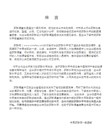
D.引导同位语从句时,切不可错用which。例如:
Word has come that some American guests will come to visit our school next week. 有消息说下周将有一些美国客人来我校参观。
____ you have seen both fighters, ____ will win?
A. Since; do you think who B. As; who you think
C. When; whoever D. Since; who do you think
解析:根据上面的讲解,不难知道答案是D。其中do you think是插入成分,其余部分是宾语从句,作think的宾语;由于引导词在从句中作主语,所以要用主格who(不用whom)。
-I drove to Zhuhai for the air show last week.
-Is that ____ you had a few days off?
A. why B. when C. that D. where
解析:答案是A,why引导的从句作表语,同时why在从句中作原因状语。这里之所以选why,而不是when或 where等,唯一的依据便是句子的逻辑含义,及语境。
whatever,whoever,whichever引导名词性从句
一、基本用法概说英语中的-ever 词主要包括 whatever, whoever, whichever, whenever, wherever, however 等,其中可引导名词性从句的主要有 whatever, whoever, whichever等,其中可引导Roman'; mso-ascii-font-family: 'Times New Roman'">。这里所说的名词性从句主要指主语从句和宾语从句,它们通常不用于引导同位语从句,同时也很少用于引导表语从句。如:Whatever he said was right. 无论他说什么都是对的。(引导主语从句)I don’t believe whatever he said. 无论他说什么我都不信。(引导宾语从句)在某些特定的语境中,也可用于引导表语从句。如:
- 1、下载文档前请自行甄别文档内容的完整性,平台不提供额外的编辑、内容补充、找答案等附加服务。
- 2、"仅部分预览"的文档,不可在线预览部分如存在完整性等问题,可反馈申请退款(可完整预览的文档不适用该条件!)。
- 3、如文档侵犯您的权益,请联系客服反馈,我们会尽快为您处理(人工客服工作时间:9:00-18:30)。
20111013Grammars V名词性从句主要包括主语从句、宾语从句、表语从句和同位语从句。
1. 主语从句I. that引导的主语从句that无词义,只起引导主语从句的作用,在从句中不但当成分,但不能省略。
That they will refuse the offer is unlikely.That light travels in straight lines is known to all.II. whether引导的主语从句该从句含有选择的意义,不能用if替换。
Whether he’ll say or leave doesn’t matter.III. 连接代词引导的主语从句连接代词在从句中作主语、宾语或定语,均不能省略。
What you will do next will influence our whole plan.Who will chair the meeting has not yet been decided.IV. 连接副词引导的主语从句连接副词在从句中作状语,均不能省略。
When we must fulfill our production task is am important question. V. 主语从句的位置主语从句可以直接放在主语位置上,也可以用it作形式主语,而将主语从句放在句末。
It hasn’t been decided who will head the group.It is common knowledge that the whale is not a fish.It seems that you know a lot about computer.2. 宾语从句I.that, whether, if引导的宾语从句They claimed that their team had won.I doubt whether/if they will be able to arrive here on time.II. 连接代词引导的宾语从句Do you know who invented the computer?He will do whatever the teacher asks him to do.III. 连接副词引导的宾语从句Does anybody know how or why it happened?He told me where he lived.IV. 作某些形容词的宾语有些动态形容词,作表语时,可跟that引导的意义上相当于宾语的从句。
这类形容词有:afraid, glad, confident, certain, sure等。
I’m sorry that I missed the football match.He is confident that computers will be used increasingly in English teaching.V. 使用宾语从句要注意的问题1. 形式宾语it在SVOC结构中,如果宾语是宾语从句,须用形式宾语it代替,而将宾语从句置于宾语补足语之后。
He has made it clear that the meeting will not be postponed.We consider it necessary that the instrument be adjusted each time it is used.2. 否定转移在think, believe, suppose, expect等动词所跟的宾语中,如果从句谓语是否定的,一般要将否定词not转移至主句谓语上去。
I don’t think he has time to play chess with you.3. 宾语从句的替代在hope, believe, imagine, suppose, guess, think等动词以及“I’m afraid...”之后,可用so代替一个宾语从句,该宾语从句通常是上文提到的一件事。
—Do you think we will have good weather?—I hope so.其否定形式可用上述动词的否定式,或者not代替so。
I don’t believe so.I believe not.3. 表语从句I.that, whether引导表语从句One advantage of solar energy is that it will never run out.The question remains whether we should accept their invitation.II. 连接代词引导的表语从句The point is not who will go, but who will stay.III. 连接副词引导的表语从句What I want to know is when the broadcasting begins every morning.This is where our basic interest lies.4. 同位语从句I.常跟同位语从句的名词同位语从句用来表示名词的内容,对其加以解释。
能跟同位语从句的通常是具有一定内容含义的名词,常见的有:fact, idea, news, hope, conclusion, evidence, proof, belief, suggestion, order, proposal, opinion, sign, thought, wish, question, problem, rumor等。
No one can deny the fact that he has made much progress.We were all overjoyed at the news that the performance turned out a success.II. 同位语从句的引导词同位语从句通常由that引导,但随着与其同位的名词不同,也可由whether, when, where, how, what, why等引导。
The question who should go abroad on this business tour requires consideration.They are faced with the problem whether they should continue the work.III. 同位语从句的位置同位语从句有时并不紧跟在有关名词后面,而是被其他词分隔开。
A saying goes that practice makes perfect.An idea occurred to him that he might borrow the money from his father.1. You should carefully think over the manager said at the meeting.A. thatB. whichC. whatD. whose2. A warm thought suddenly came to me which I might use the pocket money to buy some flowers for my mother’s birthday.3. is known to us all is that the 2012 Olympic Games will be held in London.A. ItB. WhatC. AsD. Which4. He failed to live up to had been expected of him.A. whatB. whichC. thatD. all5. The old man was so angry and spoke so fast that none of his children understood that he meant.6. I know Jonathan quite will and never doubt he can do a good job of it.A. whetherB. thatC. whenD. what7. How close parents are to their children a strong influence on the development of the children’s character.A. haveB. hasC. havingD. had8. The fact came up specific speech sounds are recognized by babies as young as 6 months old.A. whatB. whichC. thatD. whose9. These wild flowers are so special that I would do I can to save them.A. whateverB. thatC. whichD. whichever10. There is no doubt you will pass the exam this time. You have worked so hard in the past months.A. whetherB. thatC. ifD. what11. After the fire, would otherwise be a cultural center is now reduced to a pile of ashes.A. thatB. itC. whichD. what定语从句定语从句在句子中起定语作用,修饰名词、代词,有时也可修饰一个句子或句子的部分。
被定语从句修饰的词称为先行词。
引导定语从句的连接词有:关系代词:that, which, who, whom, whose, as等;关系副词:when, where, why等。
1. 限定性定语从句和非限定性定语从句限定性定语从句充当名词的修饰语,对先行词起限定作用,其内容与先行词关系密切。
若去掉此定语从句,剩下的部分则含义不明确、意义不完整或完全改变。
The news that had spread quickly through the town proved to be true.I want to buy the house which has a garden.The reason why he missed the bus was that he got up late.非限定性定语从句与先行词关系较松散,只是对先行词做进一步的解释、补充或说明。
